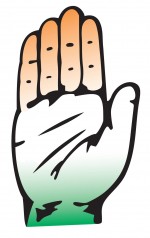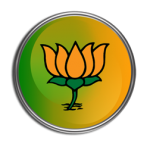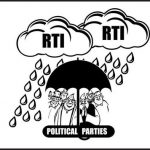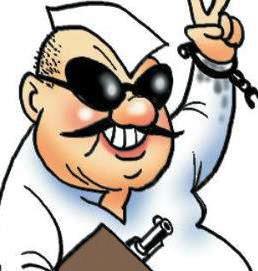This month saw the passing of a judgement by India’s Central Information Commission (CIC), that classifies nationally recognized political parties as ‘public authorities’.
What does this mean?
This means is that common citizens can now file RTI applications to political parties to obtain information. For instance, a citizen could inquire about internal elections in a party or about financial sources/expenditures of a party. The judgement is applicable to ‘nationally recognized’ political parties. This means that parties which are most representative of the Indian electorate on a national level, are the ones that are covered by this judgement. This list comprises of Congress, BJP, BSP, NCP, CPM and CPI.
How do the political parties feel about this?

The political parties are appalled by the fact that they are being directed to be more transparent. Rarely do all parties across the political spectrum take a united stand, but this issue has seen everyone from the left to the right come together in one voice against this judgement that would hold them publicly accountable. At this point the only political parties that have wholeheartedly embraced this judgement are the Aam Aadmi Party and the Trinamool Congress (though neither of these are nationally recognized by the Election Commission).
But don’t political parties exist for the citizens?
Normally the answer should be a resounding YES. But based on many of the reactions of most parties it seems that they are averse to being answerable to the Indian people. In fact, one Congress minister has stated that in his opinion, political parties are actually ‘private organizations’!
In order to understand this better, let’s take a look at the constitutions of India’s nationally recognized parties. Every political party has a self-determined constitution, which dictates the reason for the parties existence.
The Indian National Congress starts its constitution with the words, “The object of the Indian National Congress is the well-being and advancement of the people of India….”
—————————————–
The stated objectives of the Bhartiya Janata Party include “The party aims at establishing a democratic state that which guarantees to all citizens... social and economic justice..”
—————————-
The Bahujan Samaj Party, states the preamble of India as part of the party’s aims and objectives and says, “The chief aim and objective of the party… to secure to all citizens: Justice, social, economic and political…”
————————————-
Objectives of the Nationalist Congress Party include, “…permitting the members of the Party to make their best individual contribution to enrich the lives of the people in all spheres.”
—————————
The stated aim of the Communist Part of India (Marxist), includes the sentence “Its aim is socialism and communism through the establishment of the state of dictatorship of the proletariat (working-class people).”
—————————
The preamble of the Communist Party of India includes the sentence, “…the achievement of power by the working people, based on socialist democracy, is essential.”
——————-
Hence it is obvious that each of these political parties clearly claim to exist for the best interests of citizens of the country. Irrespective of the rationale given by the CIC in its judgement, the political parties should see no issues with being answerable to the public of India. It seems that the parties are almost afraid of public scrutiny.
What could the parties be afraid of?
This could be an endless list. Currently, the world’s largest democracy has completely undemocratic political parties running it. The institutionalized nepotism and financial ambiguity within political parties is well documented. Here’s another example of some of this ambiguity – All political parties need to declare individual donations in excess of Rs. 20,000 to the IT department. One common ruse used by parities is to say that most/all donations received were each under the value of Rs. 20,000 (Behenji happens to be the master at doing this for BSP). Hence the IT department has no clue as to where most of these donations come to the party from.
Most organizations would normally benefit from greater accountability and transparency. Hence it almost seems absurd to many that political parties are so drastically opposed to improving their own operations and thereby benefiting the citizenry. There will always be endless bickering among the parties for issues like the Lokpal bill and public policies but it seems that they have found common ground for this cause i.e. ensuring that the people of India stay as aloof from their ‘rulers’ as possible.
——–
 Copyright secured by Digiprove
Copyright secured by Digiprove










desh mein sabse corruption regional party karta hey , inko bhi rti ke dayere mein rehena chahiye , wese hum british rule to dekha nehi , mujhe logta hey ki aaj ke mukabile british rule sahi tha , gulam hote to achha tha , kam se kam aaj ye hatya , rape , corruption india nehi hota , jai hind
Well researched. They want the ordinary Indian not to scrutinise their actions at all. Wonder if the majority of the ordinary Indians feel they benefit from any of these parties.
Very true! these ppl just hoodwink;they have spoiled democracy,and made it a country of politicians…now all below avg ppl plunge into politics and swell up the congress party.
These political parties are just declared as Publick authorities. It brings parties under RTI. Nothing is going to change. We can feel good about it but RTI itself is a very lengthy process full of loop holes. Politicians have build parties and their own stature after toiling hard and betraying the countrymen. Do you really think it is going to work towards betterment in any case?
Yes. It is not a silver-bullet and we should stop fantasizing about coming up with one. It’s a patient step-by-step process.
Citizens now have a channel to question political parties directly and the political parties will be obligated to engage the citizens. This is one of the biggest pluses of this judgement. In response to RTIs filed with parties, any absence of information or any revelations that the information provides can then be escalated by the citizens. It’s a huge step towards increasing accountability and towards the political reforms needed.
https://www.youtube.com/watch?v=ZiqIOaW3FlE
You may like this post –
It talks about how political parties (mainly the Congress) have built symbols for their brand – often with public funds. https://www.wahsarkar.com/2011/05/saare-jaha-se-accha-gandhistan-humara/